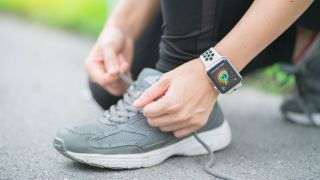Back in 2015 I proclaimed that Apple was going to make the world’s best running watch. I theorised that, while it was a mediocre smartwatch in 2015, it would get better and better and the apps would make it a real rival to the likes of Garmin.
“Should runners buy an Apple Watch this year? No way,” I wrote, smugly thinking I was clever and prescient, only for the next sentence to make me look like a fool in 2021. “For the same price you can get something hugely more useful from Garmin, Polar or even Adidas. But don’t be surprised if you start seeing Apple Watches on the arms of competitors in 2017… or even on your own.”
Actually… maybe I wasn’t so far off (apart from the 2017 prediction). Sure, most enthusiast runners aren’t using an Apple Watch and are much more likely to slap a Garmin, Polar or Suunto on their wrist.
But not all – I get a lot of questions about whether an Apple Watch will hold up to a marathon (or even ultramarathon) and I’m able to happily say yes – it’ll go far longer than before, and the efficiency of the Apple Watch 6’s chip mean it’s the most efficient out there and a growing number of people are trusting Apple to get them through their burgeoning running career.
Back in 2015, I theorized that Apple would add GPS, elevation tracking, cadence and more – that the likes of Adidas, Nike and Strava would all develop great running apps to make the Watch a useful thing to have on your wrist when smashing the soles of your feet into pavement.
And, apart from cadence, it’s all appeared. Good GPS monitoring, rolling mile average speed, an impressive suite of fitness apps from Strava, MapMyRun, Nike and Adidas are all available on the Watch and are combined with one of the best smartwatch experiences day to day.
Music to my ears

So why was I not strapping the Apple Watch to my wrist every time I popped out for a speed interval session, lung-busting Thursday 10k or a disgustingly never-ending 20 mile trot? Well, there are a few reasons, but one of the massive ones was music playback when running.
I’m not an Apple Music subscriber, and this was the only platform to offer offline music (as in saving the music to your Watch so you didn’t have to take the phone with you on a run) unless you wanted to pay extra just to have a mobile data connection for your Apple Watch.
More popular running watches had grabbed a headstart in the music game. Garmin was already tied in with Spotify, meaning I could get all the music I want on my wrist, while also getting dozens of great fitness features that I use all the time. Apple’s might have the edge as an overall smartwatch, but it’s just too basic as a running watch and forced you to subscribe to its music service to get offline track playback.
But that all changed this week. Spotify offline music support was just added into the mix, so now I can download music to the Apple Watch 6, track my long runs with mile alerts, monitor my VO2 max levels and still get all the extra smartwatch elements (like hand washing monitoring, excellent mindfulness apps) and richer notifications.
Apple Pay is also a really useful feature on the wrist – no biometric authentication means it’s easy to pay for things in this pandemic-infused world. Garmin Pay is woefully under-supported in comparison, and these little misses can add up.
Make no mistake, adding offline Spotify support is going to be a massive lure for a lot of people who are starting to dabble with running and fancy investing in an Apple Watch. It’s been frustrating waiting for Apple to open its doors to offline support for third party apps, but now it’s here (with the likes of Deezer coming too) the Watch has really added another entertainment dimension when working out.
Still a long way to go

Let’s not get too excited though – Apple is still a long, long way from making the best running watch in the world. It firstly needs to get better battery life, add in more sensors and improve the daily stress, fitness and sleep tracking to give you a more holistic picture of your energy state.
And, for the love of all that is good and pure, it needs to bring in training plans to follow to help you get fitter. It would be so easy to do, but yet Apple lags behind so many other fitness watches that let you create your own interval sessions, spot changes to your pace and generally last way longer than a few of your runs.
These things are key if you’re doing more than a couple of runs per week, and it’s inexplicable that Apple hasn’t added in these more advanced features so far.
Suunto, Garmin and others have had this fitness-focused functionality for ages, and are getting pretty nifty with their smartwatch notifications too. Some are even adding in solar glass for longer-lasting battery life, for crying out loud, and I can’t see their position as the choice for ‘proper’ fitness lovers altering any time soon.
But Apple’s broken down a big wall by fully bringing the biggest music service on the planet onto its Watch platform, and while it’s taking years longer than I thought, the Apple Watch is definitely closing the gap to the embedded players in the fitness space.
Will it get to the position of best running watch out there? Perhaps – but maybe we’re just waiting for something like a top-level Apple Watch Pro before the competition with Garmin, Suunto and more will really get interesting.
